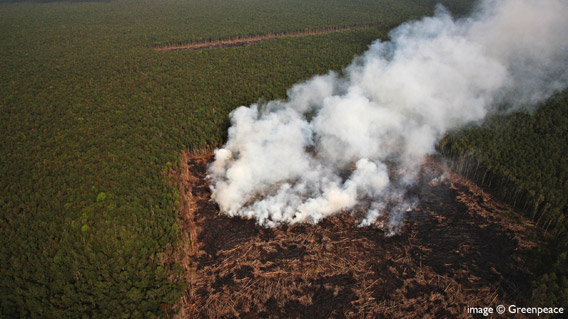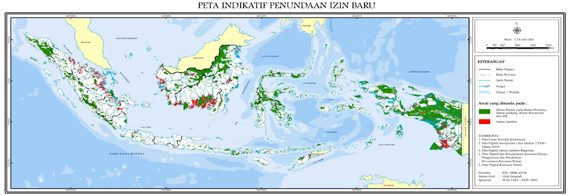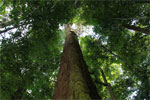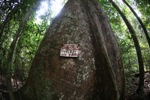
Smoke from fires set in a concession operated by PT Riau Andalan Pulp and Paper in Giam Siak Kecil area to clear land for palm oil plantations. Photo by Greenpeace
Indonesia’s Ministry of Forestry is already undermining the moratorium on new forestry concessions on peatlands and in primary forest areas, alleges a new report from Greenomics-Indonesia.
The report, The Toothless Moratorium [PDF], claims that a new decree from the Ministry of Forestry converts 81,490 hectares of forest protected under the moratorium into logging areas. The area affected is larger than Singapore.
“The 81,000 hectares were marked on the Indicative Moratorium Map as primary forest but the new decree changes the function to production forest,” Elfian Efffendi, Greenomics Indonesia Director, told mongabay.com. The areas affected included the national parks of Tanjung Puting and Sebangau.
“Changing the function from conservation areas and protection forests to production forest means that it will be logged legally,” he said. “Once logged, any primary forest will become secondary forest, and then can be potentially converted to plantation.”
However most of the affected area is already planted with oil palm or granted for logging, indicating that the initial map that underpins the moratorium has inaccuracies. The changes by the Ministry of Forestry may thus reflect realities on the ground, rather than a direct effort to undermine the moratorium. Only a small proportion of the affected area is actually primary forest, despite what the moratorium map says.

Click image to enlarge
Indonesian government sources reached by mongabay.com were unable or unwilling to comment on the report from Greenomics. One said the maps for the new decree [Forestry Minister Decree No. SK.292/Menhut-II/2011] are not yet public.
However one analyst said the development could reflect the power struggle between the Ministry of Forestry, which has long controlled the lucrative concession allocation business, and the new REDD+ Task-force set up by Susilo Bambang Yudhoyono.
“The actions reported are totally within realm of possibility, so in principle should not be a surprise,” said the analyst, who spoke on the condition of anonymity. “For now, the good guys lost the Moratorium battle, but it’s the first of many battles still to come, something which both sides know and are no doubt planning for already. So from a Ministry of Forestry point of view, in order to erode power of the other side further, it makes sense to assert their ‘autonomy’ as much as possible, not only in producing such a weak map as they did, but also in making clear that they too will ignore it when necessary for business or whatever narrow agenda motivates them.”
“My guess would be this type of behavior will continue over the coming months until either the government or judiciary is forced to take a stand or the opposition (especially the public and possibly Norway) is so demoralized by continuation of business-as-usual practices that battered credibility of REDD (a threat to the Ministry of Forestry due to reforms it will require) is damaged further and to the point of no return (that would seem to be is the ultimate Ministry of Forestry goal).”
The two-year moratorium is part of Indonesia’s commitment to reduce emissions from deforestation and peatlands degradation under a $1 billion REDD+ agreement with Norway. Central Kalimantan, the province in Borneo where the 81,490 ha of conservation areas and protection forests to were allegedly converted to production forest, is the pilot province for Indonesia’s REDD+ program.
Deforestation and peatlands degradation account for more than three-quarters of Indonesia’s greenhouse gas emissions, according to the Indonesian government.
Related articles

(06/27/2011) A raft of new studies show that protecting Southeast Asia’s forests could provide an enormous economic lift for Southeast Asia. Indeed, the studies suggest, forest conservation, sustainable forestry, and agricultural improvements, along with investments in clean energy, could spur the rise of regional “Green Tiger” economies whose development levels surpass even those achieved during the boom years of the 1990’s. The studies provide a striking rebuttal to palm oil and timber industries’ claims that deforestation is necessary for the region’s growth.
Indonesia’s moratorium undermines community forestry in favor of industrial interests

(06/21/2011) Indonesia’s moratorium on new concessions in primary forest areas and peatlands “completely ignores” the existence of community forestry management licenses, jeopardizing efforts to improve the sustainability of Indonesia’s forest sector and ensure benefits from forest use reach local people, say environmentalists. According to Greenomics-Indonesia, a Jakarta-based NGO, community and village forestry licenses are not among the many exemptions spelled under the presidential instruction that defines the moratorium. The instruction, issued last month, grants exemptions for industrial developers and allows business-as-usual in secondary forest areas by the pulp and paper, mining and palm oil industries.
(06/17/2011) World Resource Institute’s summary of key elements, and unanswered questions, in Indonesia’s recent moratorium on new forest permits.
Indonesia’s moratorium disappoints environmentalists

(05/20/2011) The moratorium on permits for new concessions in primary rainforests and peatlands will have a limited impact in reducing deforestation in Indonesia, say environmentalists who have reviewed the instruction released today by Indonesian President Susilo Bambang Yudhoyono. The moratorium, which took effect January 1, 2011, but had yet to be defined until today’s presidential decree, aims to slow Indonesia’s deforestation rate, which is among the highest in the world. Indonesia agreed to establish the moratorium as part of its reducing emissions from deforestation and degradation (REDD) agreement with Norway. Under the pact, Norway will provide up to a billion dollars in funds contingent on Indonesia’s success in curtailing destruction of carbon-dense forests and peatlands.
Is Indonesia losing its most valuable assets?

(05/16/2011) Deep in the rainforests of Malaysian Borneo in the late 1980s, researchers made an incredible discovery: the bark of a species of peat swamp tree yielded an extract with potent anti-HIV activity. An anti-HIV drug made from the compound is now nearing clinical trials. It could be worth hundreds of millions of dollars a year and help improve the lives of millions of people. This story is significant for Indonesia because its forests house a similar species. In fact, Indonesia’s forests probably contain many other potentially valuable species, although our understanding of these is poor. Given Indonesia’s biological richness — Indonesia has the highest number of plant and animal species of any country on the planet — shouldn’t policymakers and businesses be giving priority to protecting and understanding rainforests, peatlands, mountains, coral reefs, and mangrove ecosystems, rather than destroying them for commodities?